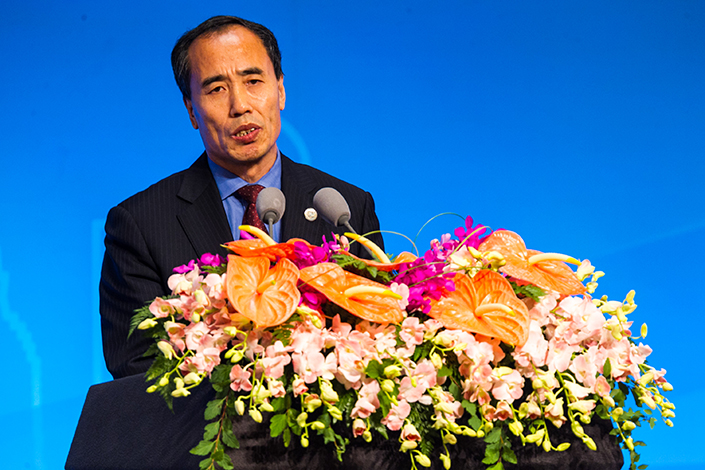China Regulators Call for Deep Reform in Banking Sector as Risks Surface

(Shanghai) — China banking regulators on Tuesday called for deep reform in the banking sector to ensure overall stability in the financial system, warning of mounting risks amid a slowdown in the world’s second-largest economy.
“We must attach more importance to safeguarding against financial risks and maintaining financial stability,” said Wang Zhaoxing, vice chairman of the China Banking Regulatory Commission (CBRC).
Wang delivered the keynote speech at the kickoff of the two-day Lujiazui Forum in Shanghai, where financial regulators and experts from home and abroad are focusing on financial reform and uncertainties in the global financial system.
“As the economy is going through restructuring and its growth has been under pressure to slow, the financial risks that have been accumulating may continue to surface,” Wang said. “Meanwhile, some new risks may also emerge, which could potentially undermine financial security and stability.”
China’s banking system is the world’s biggest in terms of assets. But risks have caught regulators’ attention in recent years.
Especially of concern is the expansion of so-called “entrusted investments” — assets that banks lend to external nonbank financial intuitions for bond, stock and commodity investments. Estimates of the amount of money parked in entrusted investments nationwide vary widely. Citic Securities’ high-end estimate was more than 19 trillion yuan ($2.79 trillion) as of December. Such practices have increased the amount of money leveraged in the system, causing alarm.
Since late March, China’s top banking regulator has issued multiple policy documents with new and tighter regulations aimed at reducing systemic financial risks, deleveraging and enhancing governance of the sector.
The policy documents identified major risks facing the country’s banking system, including bad loans, real estate sector funding, interbank borrowing, internet finance and wealth management products. Lenders are being required to step up efforts to control risks.
At Tuesday’s forum, People’s Bank of China Governor Zhou Xiaochuan echoed Wang’s call for banking sector reform and improving lenders’ corporate governance, risk controls and business assessment systems. These steps would not only make banks a pillar for shoring up growth of the real economy — the sector that produces actual goods and services — but also for maintaining financial stability, Zhou said.
The central bank chief said financial regulators should not tolerate high leverage, inadequate capital or non-performing loans. “Healthy” financial institutions are a prerequisite for guarding against a potential financial crisis, he said.
Jiang Yang, vice chairman of the China Securities Regulatory Commission (CSRC), called for coordinated regulation led by the People’s Bank of China to more effectively guard against systemic financial risks. Under a coordinated regulatory framework, financial regulators will be able to share relevant information and avoid overlap in the policymaking process, Jiang said.
Financial stability was brought front and center on China’s agenda by President Xi Jinping. On April 25, he chaired a group meeting attended by members of the Politburo to discuss “safeguarding national financial market security,” according to the state-run Xinhua News Agency. The topic is rarely covered at gatherings of senior leadership of the Chinese Communist Party, which signaled that top policymakers may step up efforts to clean up the financial system.
Contact reporter Dong Tongjian (tongjiandong@caixin.com)

- 1Cover Story: China Carves Out a Narrow Path for Offshore Asset Tokenization
- 2Drownings Shake Chinese Enthusiasm for Travel to Russia
- 3Over Half of China’s Provinces Cut Revenue Targets
- 4Li Ka-Shing’s Port Empire Hit by Forced Takeover Amid Panama Legal Dispute
- 5In Depth: China’s Mutual Fund Industry Faces Overhaul After a Banner 2025
- 1Power To The People: Pintec Serves A Booming Consumer Class
- 2Largest hotel group in Europe accepts UnionPay
- 3UnionPay mobile QuickPass debuts in Hong Kong
- 4UnionPay International launches premium catering privilege U Dining Collection
- 5UnionPay International’s U Plan has covered over 1600 stores overseas




